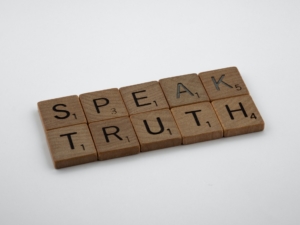What traits did you look for in a spouse before you got married? Or what are you looking for now? Is honesty an important characteristic to you? If not, it should be since it is one of the most foundational aspects of healthy relationships. Why? Because anything built on a lie isn’t made to last since it doesn’t provide security and comfort.
 Imagine you bought a house that you were told was sound. Then over the first few years of ownership, you noticed cracks in the foundations begin to develop, and you’re forced to address the issue, lest everything you had cultivated in your home fall apart. In this scenario, the lie itself is the crack in the foundation.
Imagine you bought a house that you were told was sound. Then over the first few years of ownership, you noticed cracks in the foundations begin to develop, and you’re forced to address the issue, lest everything you had cultivated in your home fall apart. In this scenario, the lie itself is the crack in the foundation.
You can’t build anything solid and lasting when someone isn’t telling the truth. So, how can you cultivate honesty in your closest relationships – especially in your marriage, or in a relationship leading toward marriage?
Building Trust in a Relationship
We can’t talk about the importance of honesty without talking about the importance of trust in a relationship. Well-founded trust requires honesty. If you can’t rely on the other person to tell you the truth and live a life of integrity, you can’t have a solid relationship with them. Trust is a fragile thing – easily broken and difficult to mend. Cherish the trust your significant other has in you and be careful not to break it.
Integrity matters because honesty is a lifestyle. When your actions match your words, and what you do in private matches what you say and do in public, you don’t have to force honesty. It simply aligns with your values and is a part of who you are. This naturally increases others’ trust in you.
Whoever walks in integrity walks securely, but he who makes his ways crooked will be found out. – Proverbs 10:9
Lying lips are an abomination to the Lord, but those who act faithfully are his delight. – Proverbs 12:22
Honesty and trust in your human relationships start with a heart that desires to live purely before God. This doesn’t mean perfection – it means walking in grace and freedom, repenting of our sins instead of covering them up, and doing the right thing no matter who is or isn’t watching.
What Makes Honesty Difficult?
While it can seem simple to avoid out-and-out lying to those you love, what’s often difficult is openness about yourself. There’s more than one component to being a truth-teller, after all. Avoiding lies is one aspect of honesty and being vulnerable is another.
A lack of integrity

Integrity means, “The quality of being honest and having strong moral principles that you refuse to change.” Honesty is how you communicate with others; integrity is who you are. If you’re not a person of integrity, cultivating honesty will be impossible, because it’s not just an external behavior, but comes from the heart.
How do you cultivate integrity? By asking God to change you from the inside out, focusing on your own conscience and responsibilities instead of what others should be doing, and seeking to serve God instead of yourself. God promises that He will give wisdom to those that ask him for it in faith (James 1:5).
Vulnerability
The word vulnerable means, “Susceptible to emotional or physical attack or harm,” or “easily damaged by something negative or harmful.”
“Vulnerability is when a person willingly takes the risk to reveal their emotions and weaknesses… This emotional openness is essential in all healthy relationships, as it paves the way for deeper understanding and evokes the empathy necessary for healthy long-term relationships.” – Verywell Mind (emphasis added)
This type of emotional vulnerability is risky and is the reason we don’t become instant close friends with everyone we meet. It takes time to assess whether we can trust another person because when we reveal our emotions and weaknesses, we risk being hurt. The reward of closeness and quality relationships often makes the risk worth it, but it all depends on whether we can trust the other person not to intentionally wound us.
Hurt and conflict happen in all relationships, but if someone truly doesn’t want to hurt you but is just human like you, hurt can happen and still be a part of an overall healthy relationship. It’s when a person lacks fundamental characteristics such as integrity, loyalty, kindness, etc., that you should question whether the relationship is safe and healthy.
What Honesty is Not
 It’s important to give a couple of caveats about honesty before moving on to tips for improving honesty in your relationship. As in so many areas of life, truthfulness in a relationship is a balancing act. On the one hand, you want to be open and truthful with your spouse. On the other hand, you don’t need to tell them every detail of every thought you have.
It’s important to give a couple of caveats about honesty before moving on to tips for improving honesty in your relationship. As in so many areas of life, truthfulness in a relationship is a balancing act. On the one hand, you want to be open and truthful with your spouse. On the other hand, you don’t need to tell them every detail of every thought you have.
In fact, the idea of honesty can be abused. You might feel guilt or shame for not revealing every aspect of your life to someone, or they may use the concept of honesty to control you and demand accountability for every action you take.
This may sound extreme, but it’s a common feature of abusive relationships that often starts gradually. We tend to agree with the precedent that accountability towards a spouse is a valid need in a relationship, but it can become a slippery slope in an unhealthy relationship.
Consider two things that honesty is not:
Always providing all the details of everything. Whether it’s your past before the relationship, or what you do and where you go on an everyday basis, being honest doesn’t mean you owe your spouse a detailed description of everything that happens. General information is sufficient.
If your spouse is feeling insecure, regaling them with details won’t help, although if you choose to provide details to reassure them that can be helpful in the short term. Cultivate your overall integrity and build trust over the long term, rather than feeling the need to nitpick every aspect of a situation to prove that you’re honest.
An invitation to be controlled. Honesty doesn’t mean you have to account for every penny you spend or every errand you run. It’s not lying to be an independent adult. If you feel your spouse is controlling or you’re not sure what you think about the situation, individual counseling can help you identify any problematic patterns and decide how best to respond.
Tips for Improving Honesty in Relationships
 Be consistent. Over time, trust will increase as your words and actions show that you’re not throwing curveballs – you’re committed to truth and dependability for the long haul.
Be consistent. Over time, trust will increase as your words and actions show that you’re not throwing curveballs – you’re committed to truth and dependability for the long haul.
Communicate! Don’t leave your spouse to wonder what you’re thinking and feeling. Make time regularly to let them in on your inner world. Find a healthy balance of solitude and togetherness so you can carve out time to talk and connect.
Follow through on your commitments (which implies that you make commitments). Sometimes it’s not possible to keep a commitment, but whenever you can, follow through on what you’ve said you’ll do.
Do the right thing. No matter who is or isn’t watching, do what you believe is right. That commitment will flow into how you act in your relationship.
Admit when you’re wrong or have made a mistake. None of us are perfect, but owning up to our mistakes, failures, and sins is a huge step on the road to being a person of honesty and integrity.
If you’re struggling with honesty in a relationship or want to work on building better trust with your spouse, contact [Christian Counseling] today. Use our contact form [link] or call us at [phone #]. Individual, couples, and/or marriage counseling are available to help you develop a stronger and healthier marriage today.
Resources:
https://www.mindbodygreen.com/0-5775/5-Reasons-to-Be-Honest-in-Love.html
https://www.psychologytoday.com/us/blog/compassion-matters/201506/5-ways-build-trust-and-honesty-in-your-relationship
positivepsychology.com/build-trust/
https://www.verywellmind.com/why-vulnerability-in-relationships-is-so-important-5193728
“Speak Truth”, Courtesy of Brett Jordan, Unsplash.com, CC0 License; “Pixie Lights”, Courtesy of Diego PH, Unsplash.com, CC0 License; “Married Friends”, Courtesy of Priscilla Du Preez, Unsplash.com, CC0 License; “Mushroom”, Courtesy of Laura Adai, Unsplash.com, CC0 License











Leave A Comment